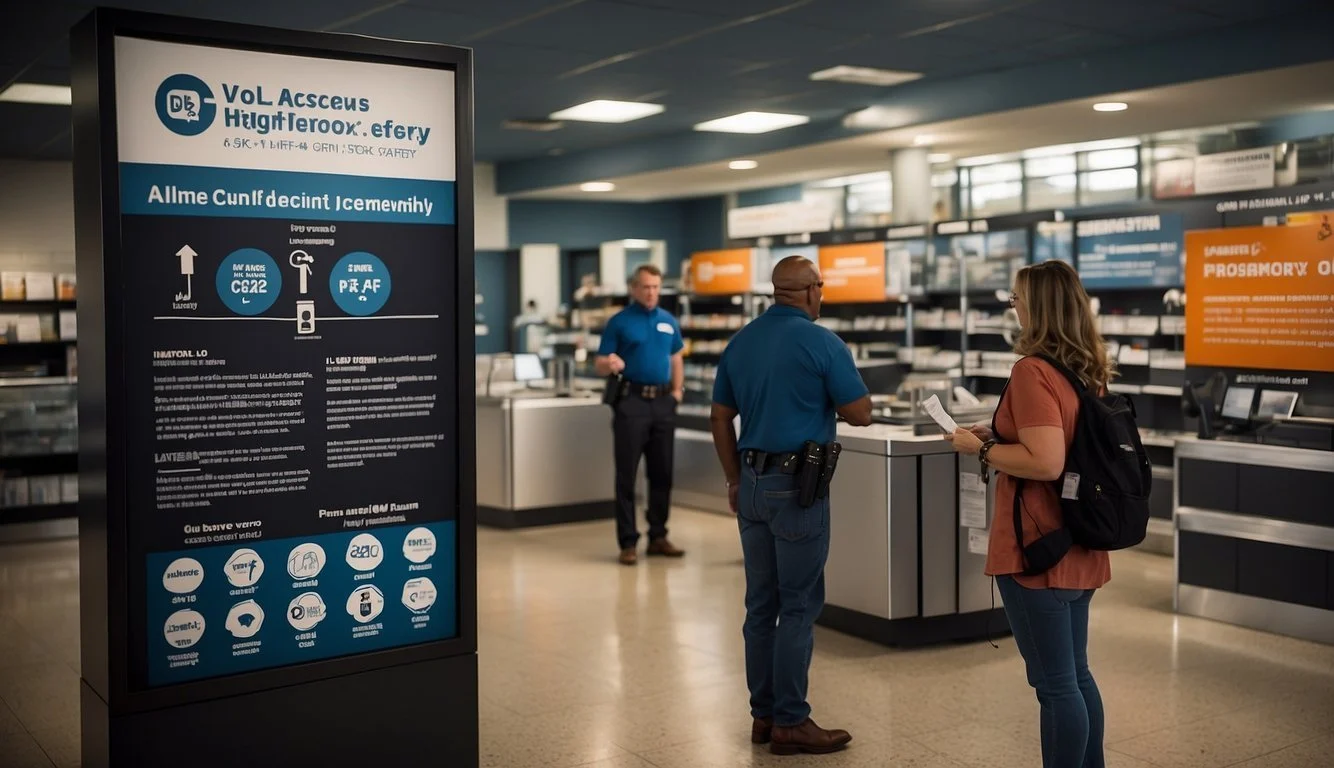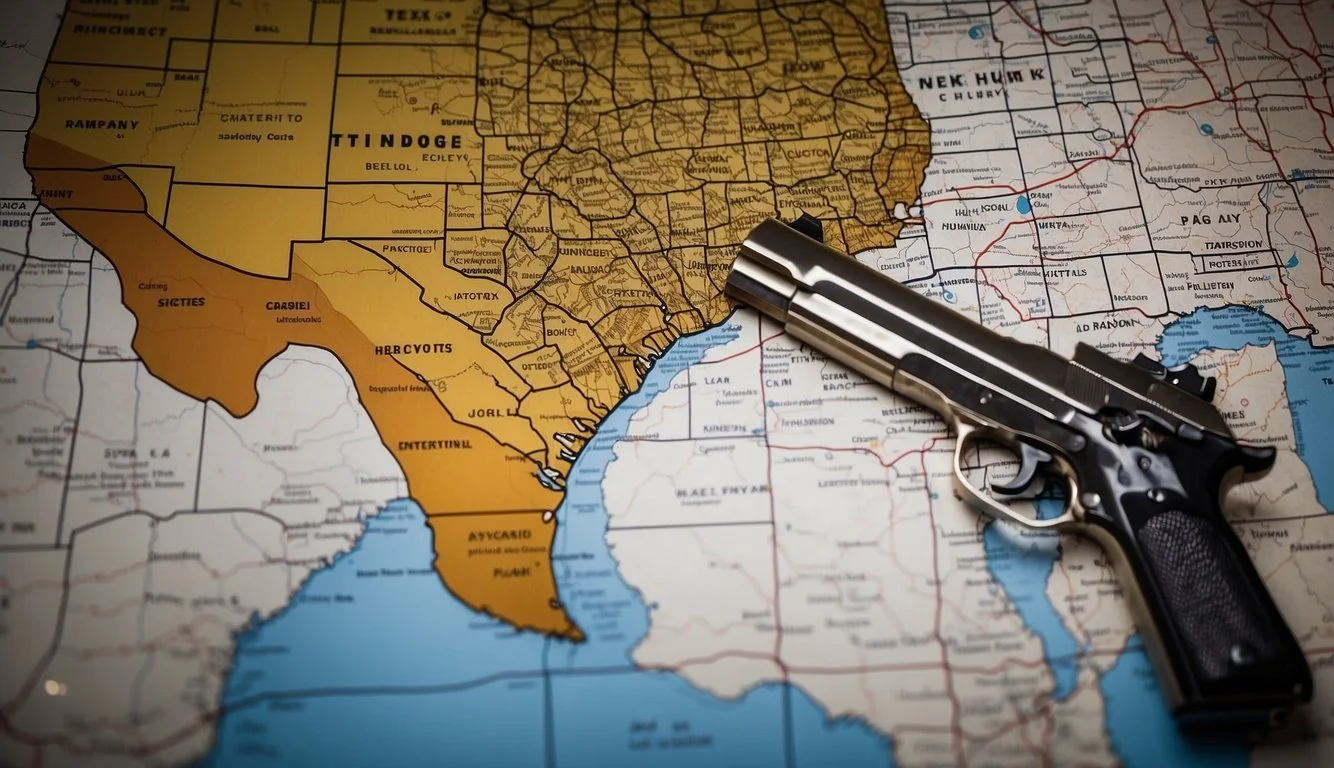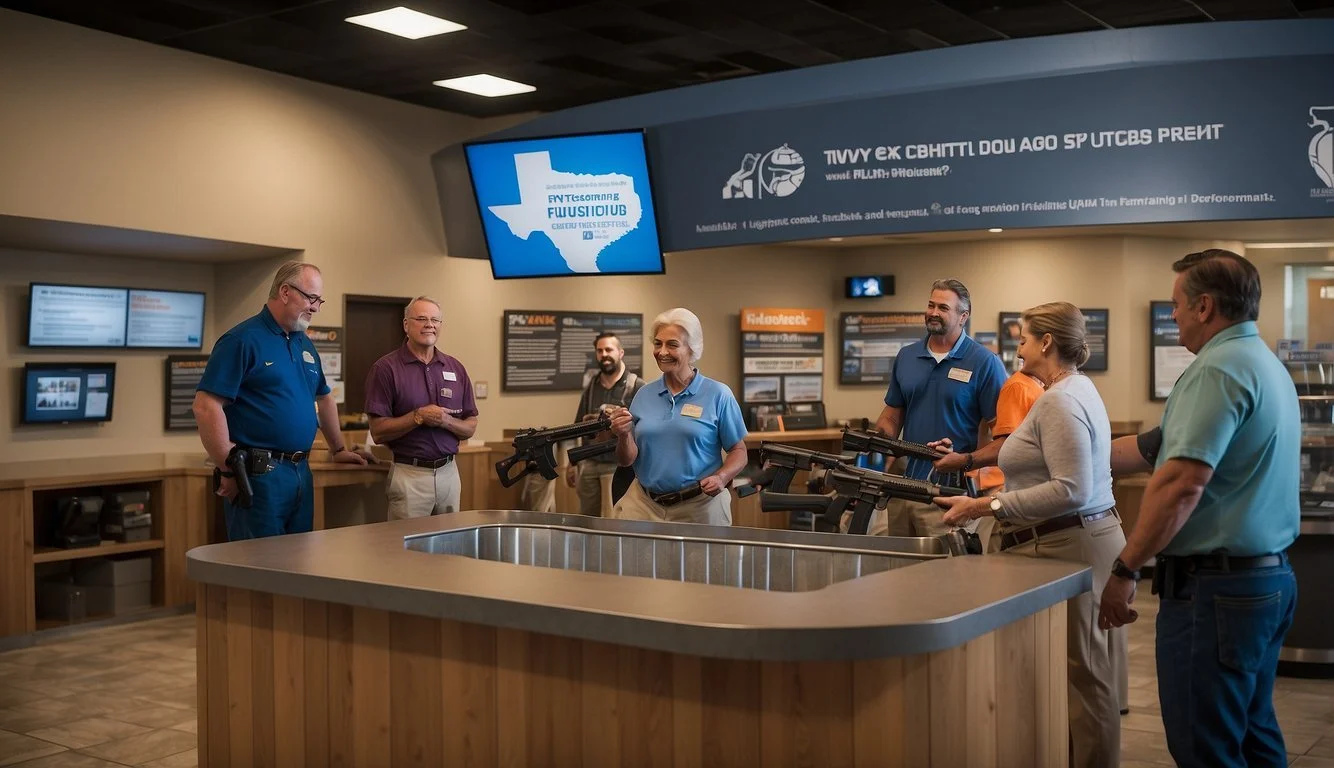Resources for Visitors Concerned About Gun Safety in Texas
Essential Information and Tips
Visitors to Texas who are concerned about gun safety will find a variety of resources aimed at promoting public safety and reducing gun violence. One key initiative is Texas Gun Sense, which advocates for evidence-based policies such as raising the legal age requirement for purchasing semi-automatic rifles and adopting extreme risk protection orders. These measures aim to create a safer environment for both residents and visitors.
Moreover, the state has seen significant changes in its gun laws, including the recent introduction of permitless carry. As of September 1, Texans can carry a handgun in public without a license. This legislative shift underscores the importance of staying informed and taking personal precautions to ensure safety while traveling in Texas.
Organizations like Giffords provide valuable information and resources for those looking to understand the broader context of gun violence in Texas and effective strategies for prevention. By arming themselves with knowledge and leveraging local initiatives, visitors can better navigate the complexities of gun safety in the Lone Star State.
Understanding Gun Violence in Texas
Gun violence in Texas impacts every aspect of life, from daily safety to community well-being. Critical issues include high numbers of deaths and injuries, the various types of incidents such as suicides, homicides, and mass shootings, and the significant effect on communities.
Gun Deaths and Injuries Statistics
An average of 3,288 people die by firearms each year in Texas. This translates to an alarming rate of 11.8 deaths per 100,000 people. Firearm injuries are also considerable, adding a substantial burden to public health resources.
The data from 2018 to 2021 highlights that Black individuals are six times more likely to die by firearm than white individuals in Texas. These statistics underscore the profound and disproportionate impact of gun violence on specific communities.
Suicide, Homicides, and Mass Shootings
Gun-related incidents in Texas include suicides, homicides, and mass shootings. Firearm suicides contribute significantly to the overall gun deaths, reflecting the need for mental health support and intervention programs.
Homicides involving guns are highest among Black communities, often driven by systemic issues, including poverty and lack of resources. Mass shootings, though less frequent than other forms, create widespread fear and call for enhanced public safety measures. Each type of incident requires targeted strategies to mitigate their occurrence and severity.
Impact on Communities
Communities in Texas bear the brunt of gun violence. The psychological and emotional toll on residents, particularly those in high-risk areas, is immense. Community Violence Intervention Programs aim to reduce this impact by addressing the root causes of violence.
Public safety initiatives focus on safe gun storage education and extreme risk protection orders to prevent potential shootings. Investments in these areas can significantly lower the rates of firearm injuries and deaths, contributing to safer, more resilient communities.
Efforts by organizations such as Texas Gun Sense are crucial in advocating for these changes and providing critical resources to at-risk populations.
Statewide Legal Framework
Texas has specific regulations governing gun ownership, use, and sales. Lawmakers frequently update these regulations to address safety concerns, such as background checks and restrictions on certain firearms.
Current Texas Gun Laws
As of September 2021, residents no longer need a license to carry a handgun. This legal change, enacted by the Legislature, means anyone aged 21 and over can carry a handgun without a permit.
Certain individuals, like those convicted of felonies, may not possess firearms. The law also addresses carry laws for vehicles, allowing for the transport of firearms in cars and boats.
Gun Sales and Background Checks
Texas requires federally licensed firearms dealers to conduct background checks. These checks aim to prevent sales to prohibited individuals, including those with felony convictions or certain restraining orders.
Private sales between individuals do not mandate background checks by state law, although some advocates call for policy changes to close this "loophole." Legislative efforts focus on balancing the right to bear arms with public safety concerns.
Age Restrictions and Semi-Automatic Rifles
Texas law imposes specific age restrictions on firearm purchases. Individuals must be at least 21 years old to buy a handgun. For long guns and semi-automatic rifles, the minimum age is 18.
Discussions continue among policymakers regarding raising the purchasing age for semi-automatic rifles. Age-based restrictions aim to mitigate risks associated with younger individuals accessing powerful firearms.
Extreme Risk Protection Order
Texas currently does not have a statewide Extreme Risk Protection Order (ERPO) law. ERPOs allow law enforcement or family members to petition a court to temporarily confiscate firearms from individuals deemed to be a danger.
Legislative debates consider ERPOs as a preventive measure against gun violence. Proponents argue they provide necessary intervention, while opponents raise concerns about due process and Second Amendment rights.
Prevention and Intervention Strategies
Efforts to address gun violence in Texas involve a multifaceted approach. From prevention initiatives to community-based interventions, safe storage campaigns, and support systems for victims, various strategies are essential to ensuring comprehensive gun safety.
Gun Violence Prevention Initiatives
Texas implements gun violence prevention initiatives that focus on evidence-based policies. Organizations like Texas Gun Sense prioritize raising the legal age for purchasing semi-automatic rifles and advocating for extreme risk protection orders.
These measures aim to limit access to firearms for individuals who may pose a danger to themselves or others. By collaborating with policymakers, these groups strive to enact laws that safeguard communities effectively.
Community Violence Intervention Programs
Community violence intervention programs play a critical role in reducing gun violence in areas with high rates of firearm incidents. Programs supported by the Giffords Center for Violence Intervention and similar organizations work within communities to break cycles of violence.
These programs involve partnerships with local leaders, law enforcement, and social service agencies to address the root causes of violence. Specific attention is given to communities disproportionately affected by gun violence, such as Black and Hispanic populations in Texas.
Safe Storage and Education Campaigns
Safe storage and education campaigns are vital for preventing accidental shootings and unauthorized access to firearms. Initiatives like those promoted by Texas Gun Sense encourage responsible gun ownership through educational materials and community outreach.
Efforts include teaching gun owners about the importance of using gun safes, lockboxes, and trigger locks. Moreover, public awareness campaigns emphasize the risks of improper firearm storage and the potential for tragic accidents.
Support for Victims and Affected Families
Support systems for victims and families affected by gun violence are an essential component of comprehensive violence prevention. Organizations provide resources for survivors, including counseling, legal assistance, and financial support.
Services also include advocacy for victims' rights and community healing initiatives. Structures like these are crucial for helping individuals and families recover from the trauma associated with gun violence. Partnerships with local and national support groups ensure that affected individuals receive the necessary assistance.
By integrating these various strategies, Texas aims to create safer communities and reduce the occurrence of gun violence statewide.
Resources for Texas Residents
Texas residents concerned about gun safety have access to a variety of resources including mental health services, educational materials on safe gun storage, and legal and advocacy support. Here is an overview of key resources available to ensure their safety and knowledge.
Mental Health and Counseling Resources
Mental health services in Texas play a vital role in preventing gun-related tragedies. Organizations such as Mental Health Texas offer counseling and support for individuals experiencing crisis or suicidal thoughts. Residents can also seek assistance from community-based clinics and hotlines. Collaboration between these services and initiatives like the Texas Invest In Us Coalition helps address gun violence at its root by focusing on mental health.
Key available resources:
Mental Health Texas: Offers a list of counseling services.
Crisis Text Line: Text HOME to 741741.
National Suicide Prevention Lifeline: Call 988.
Educational Materials and Safe Gun Storage
Education on safe gun storage is crucial. Texas Gun Sense promotes the use of gun safes and lockboxes to prevent unauthorized access, especially by children. Residents can access guides on proper firearm storage through the Texas State Law Library and other community organizations. Training programs and workshops, often sponsored by groups like Giffords, provide hands-on learning about gun safety.
Important educational resources:
Texas State Law Library: Offers guides on safe gun storage.
Project ChildSafe: Provides free gun locks and safety kits.
Community Workshops: Local events focused on safe gun handling.
Legal and Advocacy Support
For legal and advocacy support, Texas residents can turn to both governmental and nonprofit organizations. The Texas State Law Library offers comprehensive guides on state and federal gun laws. Advocacy groups such as Texas Gun Sense work to inform and influence policy regarding gun safety. Residents can also seek assistance from legal services to navigate specific firearm-related laws and restrictions.
Noteworthy support options:
Texas State Law Library: Free access to e-books and legal resources.
Texas Gun Sense: Advocates for evidence-based firearm policies.
Community Justice Action Fund: Focuses on legislative change to reduce gun violence.
These resources collectively aim to educate, support, and protect Texas residents by ensuring they have the tools and knowledge necessary to handle firearms responsibly and legally.
Partnering for a Safer Texas
Effective partnerships are essential to addressing gun safety concerns in Texas. Collaboration with various organizations, leveraging media and community leaders, and building robust supporter networks play crucial roles in these efforts.
Engaging with Local and National Partners
Collaboration between local and national organizations strengthens gun safety initiatives. Texas Gun Sense, for example, works closely with the Texas Department of Public Safety on the statewide Keep 'Em Safe campaign, focusing on safe storage education.
National partners like the Community Justice Action Fund bring a wealth of experience, particularly in community violence intervention programs that aim to reduce gun violence in the most impacted areas. Such partnerships facilitate the sharing of resources, strategies, and research that reinforce public safety initiatives across the state.
Leveraging Media and Community Leaders
Media and community leaders are instrumental in promoting gun safety. They amplify awareness campaigns, educate the public, and advocate for common-sense gun laws. By working with prominent media outlets and journalists, organizations can disseminate vital information on gun safety and related legislation.
Community leaders, including educators and local officials, foster trust and respect within communities, making them ideal advocates for gun safety programs. Cooperation with these leaders enhances engagement and ensures that the message reaches diverse and often underrepresented groups.
Building Supporter Networks
A strong network of supporters is vital to sustain gun safety efforts. Texas Gun Sense has successfully built a network that includes parents, students, faculty, and concerned citizens who participate actively in advocacy and education.
Implementing a supporter self-service portal can streamline communication, volunteer coordination, and event planning. This portal allows supporters to easily access resources, sign up for campaigns, and stay informed about legislative changes. Engaging supporters through regular updates and inclusive events ensures continued momentum and collective action in promoting safer communities.
Taking Action
Taking action on gun safety in Texas involves multiple initiatives, including advocacy, legislative efforts, public hearings, and opportunities to contribute or volunteer. Various organizations and individuals play crucial roles in promoting responsible gun ownership and community safety.
Advocacy and Legislative Efforts
Advocacy groups and legislative efforts are fundamental in promoting gun safety. Organizations like Texas Gun Sense and the Community Justice Action Fund focus on implementing evidence-based policies. These include advocating for raising the legal age for purchasing semi-automatic rifles and establishing universal background checks.
Legislation aims to pass extreme risk protection orders (ERPOs) to temporarily remove firearms from individuals posing a risk to themselves or others. Legislative advocacy involves working closely with lawmakers to draft and support sensible gun safety laws. Texas Gun Owners for Safety, a project launched by Congresswoman Gabrielle Giffords, exemplifies these efforts, aiming to shift the culture towards more responsible gun ownership.
Public Engagements and Hearings
Public engagements and hearings offer platforms for community members to voice their concerns and influence policy. Regular town halls and community meetings invite residents to discuss gun safety issues and potential solutions. These gatherings are essential for raising awareness and building consensus on legislative measures.
Participation in state and local government hearings on proposed gun safety laws allows citizens to provide testimony and share personal experiences. Such engagements can significantly impact the decision-making process of legislators. These public forums ensure that the voices of everyday Texans are heard and considered in crafting policies that aim to reduce gun violence and enhance community safety.
Contributions and Volunteer Opportunities
Supporters of gun safety initiatives can also contribute through financial donations and volunteerism. Many organizations, such as Everytown for Gun Safety, rely on donations to fund research and advocacy efforts. Contributions can support educational programs, public awareness campaigns, and legislative lobbying.
Volunteering provides hands-on opportunities to support gun safety initiatives. Roles might include community outreach, organizing events, or participating in advocacy campaigns. These efforts are crucial in driving grassroots support and generating the public momentum needed to influence policy changes. Engaging in volunteer opportunities helps individuals actively participate in the movement towards safer gun practices in Texas.







